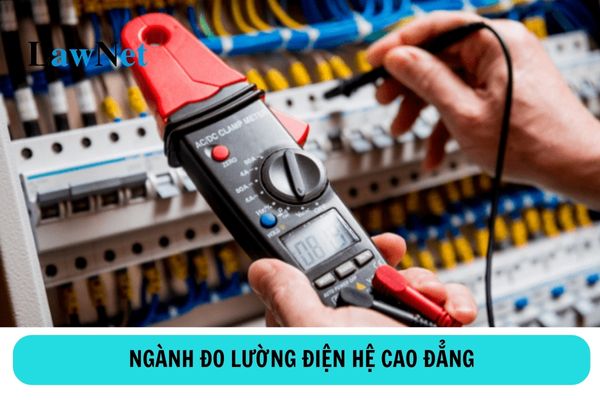What can graduates of the electrical measurement program at the college level do after graduation in Vietnam?
What can graduates of the electrical measurement program at the college level do after graduation in Vietnam?
According to Subsection 5, Section A, Part 8 of the Regulations on the minimum volume of knowledge, competency requirements that learners must achieve after graduating from intermediate-level, associate-level programs for electrical, electronics, and telecommunications fields (hereinafter referred to as the Regulations) issued together with Circular 48/2018/TT-BLDTBXH, graduates of an college degree in electrical measurement can perform the following tasks:
- Testing and verifying transformers;
- Testing and verifying current transformers and voltage transformers for measurement;
- Testing and verifying capacitors;
- Testing and diagnosing high-voltage electrical equipment failures;
- Managing the operation of electrical equipment;
- Installing electrical measurement equipment;
- Checking electrical measurement systems;
- Verifying and calibrating electrical energy measurement equipment.

What can graduates of the electrical measurement program at the college level do after graduation in Vietnam? (Image from the Internet)
What are regulations on the electrical measurement program at the college level in Vietnam?
Based on Subsection 1, Section A, Part 8 of the Regulations issued together with Circular 48/2018/TT-BLDTBXH, the electrical measurement college degree is defined as follows:
An college degree in electrical measurement is a program where practitioners perform the operation, testing, verification, calibration, and management of measurement systems in transmission grid substations (with voltage levels from 220 kV to 500 kV), distribution grids (with voltage levels from 110 kV and below), and power plants, meeting Level 5 requirements in the Vietnamese National Qualifications Framework.
The main duties include testing, adjusting, verifying, calibrating, and installing electrical measurement equipment, including various types of meters for direct current, alternating current, voltage gauges, current gauges, active power meters, reactive power meters, induction-type and digital electric meters for single-phase and three-phase grids.
Additional tasks include calibrating portable electrical measurement devices, calibrating measuring standards such as current sources, voltage sources, standard resistors, verifying insulation resistance meters (megaohm meters), and earth resistance meters (terometers).
Practitioners in Electrical Measurement work in laboratories, maintenance workshops of power plants, transmission substations, intermediary substations, inspection and calibration centers for electrical measurement equipment, utilities of electric companies, production plants for electrical measurement devices, and businesses trading in electrical equipment.
Requirements for the field: Due to its high accuracy, employees must undergo specialized training in electrical measurement.
Due to the complexity of the field and working environment, employees must be in good health, calm, quick-reacting, creative, and highly disciplined at work, and must strictly adhere to the Electricity Law 2004, Measurement Law 2011, and the business processes of the Vietnam Electricity Group.
Minimum knowledge volume: 2,400 hours (equivalent to 86 credits).
What are the knowledge requirements for graduates of an electrical measurement college degree in Vietnam?
Based on Subsection 2, Section A, Part 8 of the Regulations issued together with Circular 48/2018/TT-BLDTBXH, the knowledge requirements for graduates of an electrical measurement college degree are as follows:
- Explain error calculation methods; laboratory standards; technical standards for operating devices and accessories in electrical measurement systems;
- Analyze administrative procedures and regulations on contracts, negotiations, and job transfers; procedural forms for operations and tasks;
- Analyze electrical safety technical processes;
- Explain processes for inspecting, maintaining, repairing, and replacing measurement structures: From electric, electromagnetic, electrodynamic, induction, electrostatic, to electronic systems;
- Explain procedures for verifying measurement transformers (TU, TI), calibration procedures for measurement standards; verification procedures for induction and digital meters; installation procedures for cabinets and electrical boards;
- Explain procedures for managing and operating distribution transformers, 110 kV and 220 kV substations;
- Explain the structure, function, and technical specifications of voltage devices, current devices, power devices, energy meters, voltage transformers, current transformers, switching devices, grounding systems, signaling systems, control systems, protection systems, cabinets, and electrical boards;
- Explain the working principles and operational procedures for: ammeters, voltmeters, frequency meters, power factor meters, wattmeters, electricity meters; lightning protection devices and grounding systems; control and protection systems;
- Explain technical standards, safe ground resistance standards, lightning protection grounding, operational grounding; occupational safety and industrial hygiene;
- Analyze electrical connection diagrams, grounding systems, signaling systems, control systems, and protection systems for 110 kV and 220 kV substations;
- Analyze the concepts and functions of electrical measurement systems, control systems, signaling systems, relay protection systems, automation systems, and grounding systems;
- Analyze the connection diagrams of high and low voltage electrical cabinets;
- Describe methods for reading and analyzing electrical drawings;
- Evaluate the working conditions of meters, measurement systems (sensors, meters, insulation, accessories, conductors, lightning protection devices, grounding devices, warning signs...);
- Explain basic knowledge of politics, culture, society, law, defense, security, and physical education according to regulations.

